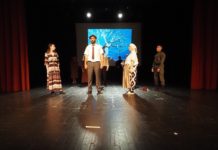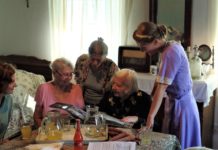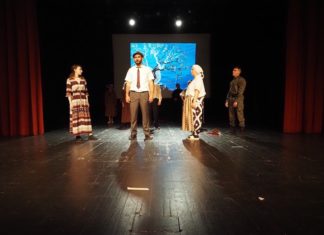The notion of belonging to the Roma people is a truly special feeling of being part of those whose history is marked by migration, non-acceptance, discrimination, stigmatization, and hatred, of those who have always lived as a minority in every state and society.
At the first World Romani Congress in 1971, for the first time in history, these people asked to be called by their true name – the Roma. This was a solid start to the awakening of national consciousness. We are all connected by love and brotherhood as obvious signs of unity among Roma from different countries, whose representatives are here at the Congress, said Juan de Dios Ramírez Heredia, a Roma activist from Spain, himself a participant of the first World Romani Congress held in Orpington near London. Heredia, who later became the first European Romani parliamentarian in history, continued: These ties inspire us and strengthen the awareness that we are as one, that we are individuals who consider the sufferings and joys of each one of our brothers as their own. We vowed to spread the notion of our nation’s unity from this day forward.
Those present at the Congress, Roma delegates from nine countries and observers from additional six countries, became aware of this unity and, strongly overwhelmed by the feeling of belonging, indicated their determination and perseverance in achieving social justice and equality with the slogan ‘Opre Roma’. Opre (in some Romani chib variants Upre) can have several meanings: Up, Upwards, Above, Awake, To become aware, etc. In the context of the fraze, it would mean ‘Stand up Roma’, ‘Rise up Roma’, or ‘Forward Roma’. Also, the word ‘opre/upre’ is similar to the Hindi word ‘oopar’, meaning ‘above’, explains Benjamin Ignac, a Roma activist, a long-term employee of the ERRC (European Roma Rights Center), currently a graduate student of public policies at the University in Oxford. It is interesting that the author of the lyrics of the Romani anthem, Žarko Jovanović, also a participant of the first World Romani Congress, initially intended for the anthem to be titled ‘Opre Roma’. The phrase can be found in the fourth verse. However, the popular first verse and the title of the song “Đelem, đelem” was more recognizable at the moment and so it became the title, continues Ignac.
Even today, this slogan awakens Roma national pride because it symbolizes the process of national emancipation that started in 1971 and could no longer be stopped. The decision to remove the humiliating term “Gypsy” for members of the Roma, which marked centuries of marginalization and exclusion, reverberated around the world. All Roma men and women who speak the Romani language, Romani chib, and who have been politically active are familiar with it because the slogan is used quite often, especially in the European transnational Roma movement. In the national context it is often used to encourage nationalism, pride, to celebrate Roma identity and culture, while in the international context it encourages unity, cooperation, progress but also resistance, says Ignac and adds that there are also numerous non-governmental Roma organizations that use ‘Opre Roma’ in their titles, ie Opre Roma Serbia, Opre Roma Kosovo, and Opre Roma Slovensko, whose establishment was prompted by the Open Society Foundations. In Hungary, for example, Roma leaders founded the national political party Opre Roma – Democratic People’s Party. The slogan also served as the title of two documentaries: “Opre Roma” (2017) directed by Paolo Bonfanti and “Opre Roma – Roma in Canada ” (1999) directed by Tony Papa. Furthermore, the slogan has been used on numerous other occasions, ie when celebrating International Romani day on April 8 or in the campaigns that support fight against racism.
That part of the Roma community that does not speak Romani chib, such as the Boyash Roma who live in Međimurje, southern Hungary, and Vojvodina and speak the Boyash-Romani language, do not understand the literal meaning of the slogan ‘Opre Roma’. However, those who are politically active, for example Roma activists, students, generally younger and more educated Roma, have heard of it or even used it in the right context. However, they do not have as deep a connection with this slogan as other Roma because they do not speak the original Romani language, and perhaps also because of the national pride of belonging to the Boyash, which in my opinion is ironic because the slogan itself encourages unity, not discord within the Roma community, says Ignac.
For him, the slogan is a source of inspiration and pride in being Roma. He considers it very motivating because it encourages him to fight despite the challenges that Roma still face today. The slogan encourages all Roma to support and celebrate the successes of their compatriots, Ignac says and adds that for him ‘Opre Roma’ definitely signifies a sense of belonging to a larger international community of resourceful people. I do not speak the original Romani language because I belong to the Boyash Roma and I highly value the uniqueness of our language and culture. Yet the slogan is close to me because I consider it to be very important, as well as the fact that it is used by millions of Roma around the world, who, like me, share a similar experience in fighting against discrimination. I am a member of the pan-European Roma community that crosses national borders, cultures, and languages.
At the International Conference “Roma as the Indian Diaspora – Unbreakable Ties”, held this year on the occasion of International Romani Day, from April 10 to 12 in Zagreb, Roma representatives from 17 countries brought the Declaration on the status of Roma as the Indian diaspora by shouting ‘Opera Roma’ in unison!
Among them were young Roma men and women who proudly read the text of the Declaration, conveying the spirit of unity, more or less aware of the importance of the first World Romani Congress and the slogan ‘Opera Roma’, which will certainly mark their activist engagement.












